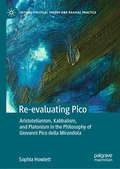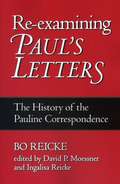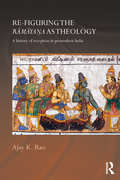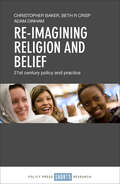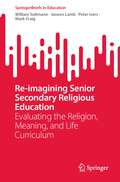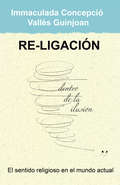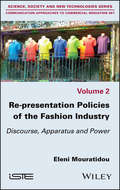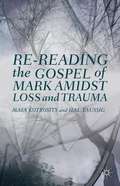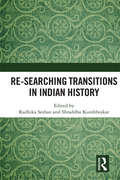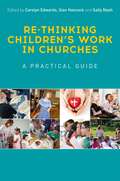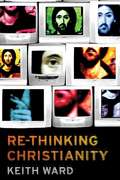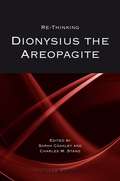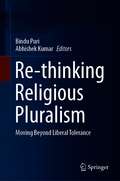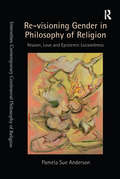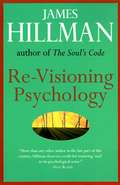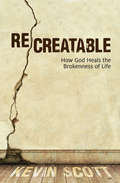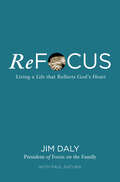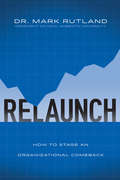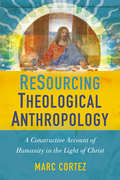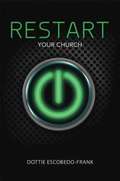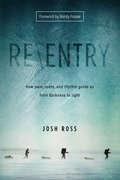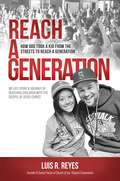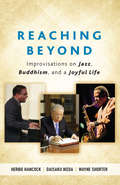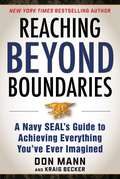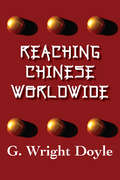- Table View
- List View
Re-evaluating Pico: Aristotelianism, Kabbalism, and Platonism in the Philosophy of Giovanni Pico della Mirandola (Critical Political Theory and Radical Practice)
by Sophia HowlettThis book offers a re-evaluation of Giovanni Pico della Mirandola, the prominent Italian Renaissance philosopher and prince of Concord. It argues that Pico is part of a history of attempted concordance between philosophy and theology, reason and faith. His contribution is a syncretist theological philosophy based on Christianity, Platonism, Aristotelianism and Jewish Kabbalism. After an introduction, Chapter 2 discusses Pico’s career, his power-relations and his work, Chapters 3 and 4 place his three pillars of Platonism, Aristotelianism and Kabbalism in their historical context, examines shared histories, and introduces the scholars around Pico who contributed so much in each of these traditions (introducing, for example, Christian Kabbalism), including exploring Pico's complex relationship with Marsilio Ficino. Chapter 5 examines the problems of concordance within Pico’s cosmology and metaphysics, including the question of God and the role of the Intellect. Chapter 6 describes Pico’s ‘exceptionalist’ version of the mystical ascent as an individualized ascetic experience. Pico eschews the contemporary desire to use a renewed christian thinking or christian-classical metaphysics to change the world (towards a Golden Age or a 'second coming') to present a personal path to God, with no return to the world.
Re-examining Paul's Letters: The History of the Pauline Correspondence
by Bo ReickeA re-examination of the dating of the deutero-Pauline letters that contradicts the generally accepted thesis that these letters were written after Paul's death.
Re-figuring the Ramayana as Theology: A History of Reception in Premodern India (Routledge Hindu Studies Series)
by Ajay K. RaoThe Rāmāyana of Vālmīki is considered by many contemporary Hindus to be a foundational religious text. But this understanding is in part the result of a transformation of the epic’s receptive history, a hermeneutic project which challenged one characterization of the genre of the text, as a work of literary culture, and replaced it with another, as a work of remembered tradition. This book examines Rāmāyana commentaries, poetic retellings, and praise-poems produced by intellectuals within the Śrīvaisnava order of South India from 1250 to 1600 and shows how these intellectuals reconceptualized Rāma’s story through the lens of their devotional metaphysics. Śrīvaisnavas applied innovative interpretive techniques to the Rāmāyana, including allegorical reading, ślesa reading (reading a verse as a double entendre), and the application of vernacular performance techniques such as word play, improvisation, repetition, and novel forms of citation. The book is of interest not only to Rāmāyana specialists but also to those engaged with Indian intellectual history, literary studies, and the history of religions.
Re-imagining Religion and Belief: 21st Century Policy and Practice
by Christopher Baker Beth R. CrispThe need to reimagine religion and belief is precipitated by their greater visibility in public life. Meanwhile, social policy responses often see them from a problem-based, rather than an asset-based, approach. However, with growing diversity of religion and belief in every sector comes the potential for new dialogues across previously impermeable policy and disciplinary silos. This volume brings together leading international authors to critically consider these challenges within legal and policy frameworks, including security and cohesion, welfare, law, health and social care, inequality, cohesion, extremism, migration and abuse. It challenges policy makers to re-imagine religion and belief as an integral part of public life that contains resources, practices, forms of knowledge and experience that are essential to a coherent policy approach to diversity, enhanced democracy and participation.
Re-imagining Senior Secondary Religious Education: Evaluating the Religion, Meaning, and Life Curriculum (SpringerBriefs in Education)
by Mark Craig William Sultmann Janeen Lamb Peter IversThis book examines and reports the findings regarding the level of satisfaction by students, teachers and parents with an innovative senior secondary Religious Education curriculum ‘Religion, Meaning and Life’ (RML). The stimulus for RML is found in the changing profile of students within faith-based schools and the motivation of school authorities to be inclusive and responsive to changing needs and priorities of students and families. Curriculum practices typically mirror this continuing renewal as community expectations give rise to innovation in curriculum practice. This concept of continuity and discontinuity is evidenced in the field of Religious Education,, which recognizes religious plurality while giving preference to an imagination centred on inclusion, hospitality and respectful dialogue. In this context, new pathways are being explored as the reality and significance of Religious Education in faith-based school remain a priority for Christian organizations in Australia.Mindful of the diversity of expectations within the Catholic school, the curriculum initiative of RML was developed, supported and implemented. The La Salle Academy of the Australian Catholic University reviewed this senior secondary curriculum across three years and presents in this book an independent, evaluative report of the findings, together with insights for implementation at scale and associated applications across Christian faith-based institutions.
Re-ligación: El sentido religioso en el mundo actual
by Imma C. Vallès GuinjoanVENCER EL MIEDO A LA ESPERANZA <P><P> La necesidad de escribir se convirtió en una parte esencial de mí en mi infancia. A través de los relatos, los estudios, los cursos que he escrito, se han ido reflejando mis creencias y mi fe. Fe en la vida por excelencia. Fe que impulsa al ser a sobreponerse a los retos que se le presentan en la vida. <P><P>La escritura siempre ha sido un medio de conectar con mi inconsciente, mi alma, estableciendo un diálogo intimo entre mi esencia y mi existencia, entre el mundo subjetivo y el objetivo, haciéndome tocar de pies al suelo, permitiéndome paliar con satisfacción los momentos del día a día; que en sí son la verdadera existencia. <P><P> En este sentir profundo del ser vinculado a los otros y al mundo; el que os presento en este libro: re-ligación, dentro de la ilusión, el sentimiento religioso en el mundo actual; el que re-liga, el yo con los otros y lo espiritual; dando razón de fuerza a la fe que impulsa al ser hacia su centralidad.
Re-presentation Policies of the Fashion Industry: Discourse, Apparatus and Power
by Eleni MouratidouThe book studies the way the luxurious fashion develops re-presentational politics by reinvesting symbolic fields such as art and culture, religion and the sacred as well as politics, in other words fields that represent a certain common pattern of life and a common interest. I develop a semiotic approach of the way art exhibitions, print and audiovisual advertising, publishing and distribution politics as well as special ready to wear collaborations with arts such as Jeff Koons reveal the fashion industry's gesture of pretending being a non-commercial structure especially in order to cover up its industrialisation and banalization process
Re-reading the Gospel of Mark Amidst Loss and Trauma
by Hal Taussig Maia KotrositsExamining contemporary films, sculptures, and graphic novels influenced by the Gospel of Mark, Hal Taussig and Maia Kotrosits break new ground in ways of understanding traditional religious texts. The authors avoid traditional dogmatic assumptions, and use the Gospel of Mark as a resource for coping and healing.
Re-searching Transitions in Indian History
by Radhika Seshan Shraddha KumbhojkarThe idea of transitions in Indian history emerged early when the term ‘transition’ denoted shifts from one period to another. The notion of transition itself has moved beyond being primarily economic to include dimensions of society, culture and ideology. This volume brings together scholarly works that re-examine and re-define the concept of transition by looking into a range of subjects including religion, culture, gender, caste and community networks, maritime and mercantile modes, ideas of nationalism and historiographies across geographical and temporal settings. With contributions by leading scholars from South Asia, this book will be useful to scholars and researchers of ancient history, modern Indian history, sociology and social anthropology, and South Asian studies.
Re-thinking Children’s Work in Churches: A Practical Guide
by Michael Wells Ian Ross Sally Nash Howard Worsley Carolyn Edwards Sian Hancock David Csinos Isobel MacDougall Barbara Meardon Martyn Payne Ruth Radley Sam Richards Andy Robertson Keith J. WhiteDrawing on current scholarship and research by authors with experience of a range of International contexts who are experts in their field, this accessible guide focuses on approaches that encourage spiritual, physical, mental and emotional development in children.By outlining a range of lenses through which readers can reflect on their ministry with children and their families. this book offers inspiration to help them improve their practice. Up-to-date research and thinking provides a fresh and flexible understanding of work with children and families. It also prepares readers to develop and support a team that can take responsibility for the key areas needed in an effective children's ministry.With each chapter featuring practice examples, relevant theory, theological reflections, opportunities for contemplation and suggestions for further reading, Re-Thinking Children's Work in Churches is an accessible and indispensable guide for those wishing to focus on the holistic development of the child.
Re-thinking Christianity
by Keith WardThe Christian faith is often charged with being outmoded and anachronistic. A monolithic institution rooted in the past, many critics have claimed that it lacks the resources to adapt to modern society's needs and advances. In /Rethinking Christianity/, Keith Ward argues persuasively that this view is not only uncharitable, but refuted by historical evidence. Mapping the evolution of six major beliefs, from the Hellenistic restatement to the challenged of evolutionary theory, Ward demonstrates that Christianity has always been expressed in constantly changing ways in response to new knowledge and understandings of the world. Controversial, liberal, and confronting the principal questions facing Christianity today, Ward uses this basis to support the construction of his own ground-breaking theology: a 'systematic theology' for the post-scientific age.
Re-thinking Dionysius the Areopagite (Directions in Modern Theology #3)
by Sarah Coakley Charles M. StangDionysius the Areopagite, the early sixth-century Christian writer, bridged Christianity and neo-Platonist philosophy. Bringing together a team of international scholars, this volume surveys how Dionysius’s thought and work has been interpreted, in both East and West, up to the present day. One of the first volumes in English to survey the reception history of Dionysian thought, both East and West Provides a clear account of both modern and post-modern debates about Dionysius’s standing as philosopher and Christian theologian Examines the contrasts between Dionysius’s own pre-modern concerns and those of the post-modern philosophical tradition Highlights the great variety of historic readings of Dionysius, and also considers new theories and interpretations Analyzes the main points of hermeneutical contrast between East and West
Re-thinking Religious Pluralism: Moving Beyond Liberal Tolerance
by Bindu Puri Abhishek KumarThis book combines the mainstream liberal arguments for religious tolerance with arguments from religious traditions in India to offer insights into appropriate attitudes toward religious ‘others’ from the perspective of the devout. The respective chapters address the relationship between religions from a comparative perspective, helping readers understand the meaning of religion and the opportunities for interreligious dialogue in the works of contemporary Indian philosophers such as Gandhi and Ramakrishna Paramhansa. It also examines various religious traditions from a philosophical viewpoint in order to reassess religious discussions on how to respond to differing and different religious others. Given its comprehensive coverage, the book is of interest to scholars working in the areas of anthropology, philosophy, cultural and religious diversity, and history of religion.
Re-visioning Gender in Philosophy of Religion: Reason, Love and Epistemic Locatedness (Intensities: Contemporary Continental Philosophy of Religion)
by Pamela Sue AndersonA passion for justice and truth motivates the bold challenge of Revisioning Gender in Philosophy of Religion. Unearthing the ways in which the myths of Christian patriarchy have historically inhibited and prohibited women from thinking and writing their own ideas, this book lays fresh ground for re-visioning the epistemic practices of philosophers. Pamela Sue Anderson seeks both to draw out the salient threads in the gendering of philosophy of religion as it has been practiced and to re-vision gender for philosophy today. The arguments put forth by contemporary philosophers of religion concerning human and divine attributes are epistemically located; yet the motivation to recognize this locatedness has to come from a concern for justice. This book presents invaluable new perspectives on the philosopher’s ever-increasing awareness of his or her own locatedness, on the gender (often unwittingly) given to God, the ineffability in both analytic and Continental philosophy, the still critical role of reason in the field, the aims of a feminist philosophy of religion, the roles of beauty and justice, the vision of love and reason, and a gendering which opens philosophy of religion up to diversity.
Re-visioning Psychology
by James HillmanThis groundbreaking classic explores the necessity of connections between our life and soul and developing the main lines of the soul-making process.
ReCreatable
by Kevin ScottReCreatable begins with the story of a glass baking dish, the delectable aroma of tantalizing brownies, and an unseen defect that turns the promise of something delicious into a minor disaster, leaving glass fragments and brownies irretrievably intermingled. Both the dish and brownies are irrevocably lost. The implications for us are inescapable: created by God to reflect his glory and for his pleasure, we have been broken by sin to the point that we are completely useless to accomplish the purpose for which we were made. But, unlike the shattered brownie dish that gets discarded as worthless, God takes the shards of our lives and does the miraculous. He does not simply fit us back together. He takes those splinters of our destruction and uses them to re-create us: complete, restored, redeemed, and fitted to do and be all that he ever intended for us. ReCreatable leads us progressively through the impact of the creative genius of God in our lives. It points us to the reality of restored relationships, the resurrection of our role as true reflectors of God's glory, and the revolutionary life that can be ours when we learn to be true disciples--re-created to live well for God.
ReFocus: Living a Life that Reflects God's Heart
by Paul Batura Jim DalyWritten by Jim Daly, the compassionate leader of Focus on the Family, ReFocus inspires and motivates Christians to transcend political agendas and partisan battles and instead interact with others in a way that will consistently reveal the heart of God to a desperately hurting world.Our culture has become painfully polarized, often hindering relationships with neighbors, colleagues, and the very people who need to discover the love of Jesus Christ. Remembering that we are foremost citizens of heaven serving a loving Father, we who call ourselves followers of Christ can once again be known by our love.But how? In what context and through what means? How can we tear down the walls that divide our culture, our neighborhoods and workplaces and families, in this increasingly contentious world?Drawing on a rich variety of true stories and sources both historical and contemporary--from behind the scenes in today's halls of power, to moving accounts from church history, to powerful breakthrough's in Daly's own life and ministry--Daly challenges us to reclaim our responsibility, and our privilege, as God's sons and daughters.As followers of Jesus with His humility and compassion as our model, ReFocus: Living a Life that Reflects God's Heart demonstrates how Christians can show the world an inexplicable taste of grace with no agenda other than to reveal the heart of God as the loving Abba Father He is.
ReLaunch
by Dr Mark RutlandA church in deep debt with attendance down by the thousands. A college that had lapsed into a coma, its buildings in shambles, its faculty demoralized, its enrollment at rock bottom. A university facing lawsuits, scandal, and near-bankruptcy. Each situation involved different financial needs, different lost dreams, different personal wounds. But they each had one thing in common: each needed a leader who could restore hope, vision, and viability. Dr. Mark Rutland has led three institutional turnarounds over the past twenty-five years. He has seen organizations that were dying come to new life. And he knows the steps you need to take right now. How do you know what to do to help your church or organization make it, even when circumstances and personnel challenges seem too much to handle? Here are the answers. As Dr. Rutland writes in this New York Times bestseller, the true leader can say, "This book is for the rugged visionaries who see in the wreckage a hope for the future and are willing to pay the price for a relaunch."
ReSourcing Theological Anthropology: A Constructive Account of Humanity in the Light of Christ
by Marc CortezTheologians working in theological anthropology often claim that Jesus reveals what it means to be "truly human," but this often has little impact in their actual account of anthropology. ReSourcing Theological Anthropology addresses that lack by offering an account of why theological anthropology must begin with Christology. Building off his earlier study on how key theologians in church history have understood the relationship between Christology and theological anthropology, Cortez now develops a new proposal for theological anthropology and applies it to the theological situation today.ReSourcing Theological Anthropology is divided into four sections. The first section explores the relevant Christological/anthropological biblical passages and unpacks how they inform our understanding of theological anthropology. The second section discusses the theological issues raised in the course of surveying the biblical texts. The third section lays out a methodological framework for how to construct a uniquely Christological anthropology. The final section builds on the first three sections and demonstrates the significance of Christology for understanding theological anthropology by applying the methodological framework to several pressing anthropological issues: gender and sexuality, race and ethnicity, and death and sufferingX
ReStart Your Church
by Dottie Escobedo-FrankAs a result of the near-death experiences of many congregations today, denominational leaders are looking for ways to “revitalize” churches. The act of revitalization often starts with the assumption that what was once vital can be vital again, if church leaders simply do the same better. So congregations increase programs, budgets, and formulas. They look back in time, trying to recapture a period when the church’s role in society was vital. A church, seeking revitalization, typically does more of the same, but faster. However, the central story of our faith is the story of both death and resurrection. Followers of Christ like to live out the resurrection part of our faith, but they often aren't very comfortable dealing with what must come before resurrection - death.The church must be willing to live out its entire story, from beginning to end. The church needs to trust that God will bring to life what God wants to. This book suggests shifting away from the language of revitalization toward the story of death and resurrection. Escobedo-Frank focuses on ten specific “re-“ words to outline a strategy for dying and resurrecting again - for restarting the church:RecognizeRealizeRestoreReviewReformResensitizeReleaseReinvigorateReemphasizeRebirth
Re\entry: How Pain, Roots, and Rhythm Guide Us from Darkness to Light
by Josh RossHow do you survive lengthy seasons of darkness? As vital as the message of entry is to the Christian faith, many Christians are also desperate for a message of reentry after many seasons of doubt, confusion, bondage to the past, severed relationships, loss, depression, and stress. From places of darkness and shadows, God comes and reveals himself as the one who enters into our pain both as a companion who walks with us through our trials and as the one who is eager to eventually lead us into a healthier place. In January of 2014, Josh Ross traveled to Barrow, Alaska, to interact with a community that experiences over sixty-five days of darkness every winter. His time there revealed how essential the principles of reentry, roots, and rhythm are to our survival and health far beyond the Arctic Circle.
Reach a Generation: How God Took a Kid From the Streets to Reach a Generation
by Luis R. ReyesAn inspiring story of a young man who overcame all the obstacles of life in the streets. God raised him up to be a national leader and advocate for the younger generation. Reyes is challenging men and leaders across the nation to turn their hearts to this younger generation so their hearts will be turned to God. This is a true story of God&’s grace and redemption, loss and sacrifice, from overcoming to triumphantly advancing God&’s Kingdom. Pastor Luis Reyes&’ story will inspire you, encourage you, and challenge to seek God&’s vision and obey no matter the cost. His story will infuse your faith to believe beyond what you would ever imagine and see how serious God is about reaching the younger generation. We are living in the last days with a worldwide epidemic of fatherlessness, children growing up with no identity and a spiritual downfall of righteousness in our nation. We must wake up. We must rise up and be a voice for this younger generation!
Reaching Beyond
by Daisaku Ikeda Herbie Hancock Wayne ShorterIn Reaching Beyond, Buddhist thinker and activist Daisaku Ikeda explores the origins, development, and international influence of jazz with legendary artists Herbie Hancock and Wayne Shorter. Reflecting on their lives and careers, Mr. Hancock and Mr. Shorter share the lessons they have learned from their musical mentors, including Miles Davis and Art Blakey, and how the Buddhist philosophy they’ve learned from President Ikeda over the past forty years deeply resonates with the emancipatory spirit of jazz. These wide-ranging conversations include such thought-provoking topics as: • Music’s mission for peace in a time of discord • The importance of the artist’s spiritual growth • The Buddhist concept of changing poison into medicine • Ways to make the “ideal America” a reality for everyone Reaching Beyond offers positive new ideas for musicians and nonmusicians alike.
Reaching Beyond Boundaries: A Navy SEAL's Guide to Achieving Everything You've Ever Imagined
by Don Mann Kraig BeckerFor the last decade, decorated Navy SEAL, accomplished athlete, and bestselling author Don Mann has been traveling across the country giving motivational talks and in the process inspiring hundreds with the secrets behind his awe-inspiring achievements. In Reaching beyond Boundaries, Mann brings his much sought-after wisdom to the page. As an elite Navy SEAL, Mann performed seemingly impossible tasks on a regular basis. Here he details the lessons he learned from his training and shows how the rest of us can apply those teachings to our daily lives in terms of learning to push beyond our internal boundaries and achieve the goals we’ve set for ourselves, both professionally and personally. Reaching Beyond Boundaries teaches how to set and conquer both micro- and macro-goals through removing excuses, having the right mindset, and learning from successes and failures. Making your dreams a reality is possible. With Reaching Beyond Boundaries you can begin to realize your fullest potential today.
Reaching Chinese Worldwide
by Wright DoyleReaching Chinese Worldwide introduces the many ways in which Christians may communicate the truth and love of God in Christ to Chinese around the world. Drawing upon four decades of reading and experience, the author first lays a biblical foundation for cross-cultural witness, then briefly explores the various facets of ministry among Chinese: Preparation, Presence, Proclamation, Points of Contact, "Perfection" of Believers, Participation in the Body of Christ, Performance of Good Works, and Partnering with God.This nearly comprehensive survey contains both fundamental principles and practical suggestions useful for all those wanting to make a Christian impact on China.
